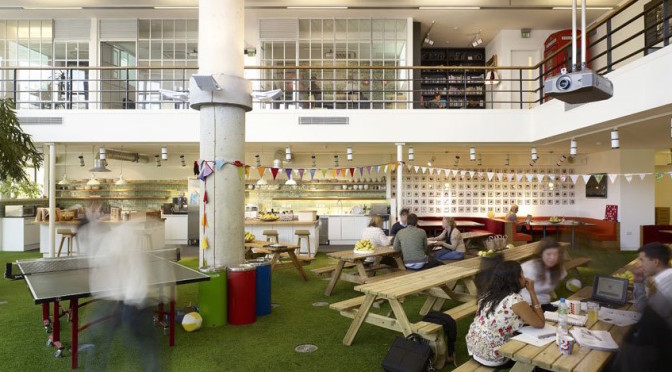
Happiness at work starts from the top. This is one of the fundamental truths of happy workplaces.
In any organization where people consistently love to work, you will find a CEO and executive leadership team that places employee happiness among their top strategic priorities and act accordingly.
One of our favorite examples of a CEO who truly gets this is Herb Kelleher of Southwest Airlines (since retired), who put it like this:
When I started out, business school professors liked to pose a conundrum: Which do you put first, your employees, your customers, or your shareholders? As if that were an unanswerable question.
My answer was very easy: You put your employees first. If you truly treat your employees that way, they will treat your customers well, your customers will come back, and that’s what makes your shareholders happy.
So there is no constituency at war with any other constituency. Ultimately, it’s shareholder value that you’re producing.
If, on the other hand, you have top brass who don’t give a damn about anything but the bottom line and their own bonuses and stock options, I can flat-out guarantee that you will create an organization with very little happiness but with a lot of fear, stress and frustration. And, ironically, with poor bottom line results.
So top executives MUST make employee happiness one of their most important goal. Both because it’s the right thing to do for the sake of their people, but also because it will actually make the company more successful. Studies consistently show that happy workplaces make more money.
But how does a CEO or top executive practice this on a daily basis? What can they do to make their organization happier?
Here are 10 great real-life examples that we’ve seen work really well in workplaces around the world.
10: Regular lunches with employees
During a speech in Istanbul, I met an executive of a huge Turkish organization who has had a monthly lunch with 10 randomly picked employees for years now. Every month 10 employees get a chance to have a nice lunch and over the course of a couple of hours get to ask any question they want and air any concerns or complaints.
They also get a chance to meet him in an informal setting and get a sense of who he is as a person.
9: Random acts of workplace kindness

Some CEOs enjoy doing little random things to surprise and delight their staff. Here’s an example from Medis, one of our clients in Iceland, where the CEO decided to make fresh pancakes and waffles for anyone passing by.
He even had a great time himself:
I thoroughly enjoyed it – the biggest joy I actually got out of observing the reaction of the colleagues !
FYI we did not announce anything but simply showed up in the corridor without notice and took people pleasantly by surprise.
8: Celebrate accomplishments
The Danish Competition and Consumer Authority is a government agency whose 200 employees work to enforce consumer regulations and keep markets competitive.
Every month they have a breakfast meeting where important information is shared with all employees. At this meeting, the director Agnete always shares 2-3 successes that the organization has had since the last meeting. She’ll highlight how they’ve completed a big project or won a court case and make sure that the people who worked on that are recognized and celebrated.
7: Encourage bad news
One CEO we know had a strong desire to receive all bad news as soon as possible. He knew bad things happened (they do in all workplaces) but he also knew that some employees were to afraid of reprisals to come out and directly say that they might miss a deadline or have to disappoint a client.
So he has trained himself and his managers to always receive bad news with a smile and a phrase like “Thank you for telling me that.” This took some practice.
That way bad news come out early and can be dealt with before it turns into a disaster.
6: Meet with new employees
One fast-growing company of ours has a tradition where the CEO hosts a monthly afternoon tea at his home for all new hires that month.
It’s a completely informal gathering that serves two functions: He gets to meet all the new people and get a sense of who they are and he takes some time to talk about the company’s history and vision which is a powerful way to show the new hires the values and purpose of the organization.
5: Solve problems

South African social media agency Quirk has a process in place that encourages employees to bring about any problems they see to the attention of the executive team. The process gives all employees a voice and guarantees action from the executives in two weeks at the most.
You can read about their process here.
4: Give employees time for family
Here is a letter that US vice president Joe Biden sent to his staff in 2014:

He explicitly tells them that it’s OK to prioritize important family events over work. Appreciating staff and giving them time for family makes them happier – and happy staff are more productive. It also combats the ubiquitous cult of overwork.
3: Say good morning
Carsten and Karsten, two sales managers at Danish company Solar, wanted to do something nice for their employees.
Early one Monday morning, they stood at the entrance and greeted every employee with a cheerful “good morning” and a breakfast they could take to their desks.
2: Celebrate mistakes
In one company, the CEO was told by a trembling employee, that the company website was down. This was a big deal – this company made most of its sales online, and downtime cost them thousands of dollars an hour.
The CEO asked what had happened, and was told that John in IT had bungled a system backup, and caused the problem. “Well, then,” says the CEO “Let’s go see John!”
When the CEO walked into the IT department everyone went quiet. They had a pretty good idea what wass coming, and were sure it wouldn’t be pretty.
The CEO walks up to John’s desk and asks “You John?”
“Yes” he says meekly.
“John, ” says the CEO, “I want to thank you for finding this weakness in our system. Thanks to your actions, we can now learn from this, and fix the system, so something like this can’t happen in the future. Good work!”
Then he left a visibly baffled John and an astounded IT department. That particular mistake never happened again.
In many workplaces, employees who do good work are rarely recognized but anyone who makes a mistake is immediately and harshly punished. This is dumb.
When we can openly admit to screwing up without fear of reprisals, we’re more likely to fess up and learn from our mistakes. And that’s why top executives should help employees celebrate mistakes.
As an example, IT company Menlo Innovations in Michigan has this banner hanging in their office:

1: Walk the halls and meet people

One day, the IKEA store in Gentofte, Denmark was a hive of activity. Not only was there a European executive meeting taking place, but the company founder, Ingvar Kamprad himself, was in the house. That’ll make most employees straighten up and put in a little extra effort.
The execs wrapped up at 6 in the evening and Ingvar then took a stroll through the entire store as if this was the most natural thing in the world, kindly greeting each and every employee. He encountered two female employees talking to each other and approached them with a smile and the words: “And what are you two lovely ladies talking about?” – following up with big hugs for both of them.
I love this because it shows a genuine interest in the employees and because Kamprad is clearly happy himself and not afraid to show it.
We know from psychological studies that emotions are contagious and top leaders can spread a lot of happiness simply by being happy themselves.
The point
This list is by no means exhaustive and it’s definitely not meant to be prescriptive. We’re not saying all executives should do these things.
What we are saying is that top executives play a huge role in creating happy workplaces. They do this in the big stuff – by making sure that the strategies, plans, goals and values they set for the organization are defined with the employees’ well-being in mind.
But they also do it in small, daily, interpersonal ways where they can show that they genuinely care about their people, can build relationships with employees and can let employees see them as real human beings.
However, this can only work under a few conditions:
- It must flow from a genuine care for the employees. If the CEO doesn’t honestly care about her employees, she shouldn’t try to fake it. But I’ve always said that if you don’t care about people, you have no business leading them.
- Executives must WANT to do things to make employees happier. It’s OK to go a little outside of your comfort zone but if you do things you actively hate, that fact will shine through and it probably won’t work.
- Actions must match words. You can’t on the one hand make pancakes or hug employees and on the other hand introduce large-scale organizational changes with no regard for how employees feel. They will see right through that.
- Consistency over the long term is mandatory. If you do this for a short while or only do it some of the time, it will be recognized as fake.
Understanding this and acting on it gives the executives in a workplace huge leverage to make their employees feel valued professionally and personally – thus increasing happiness, engagement and motivation as well as productivity.
Not doing this – and let’s face facts, most executives don’t – means failing your employees, your customers and your investors.
Your take
Do you think executives should care about the happiness of their employees? Do the executives in your workplace honestly care about their people? How do they show it / not show it?
Related posts












